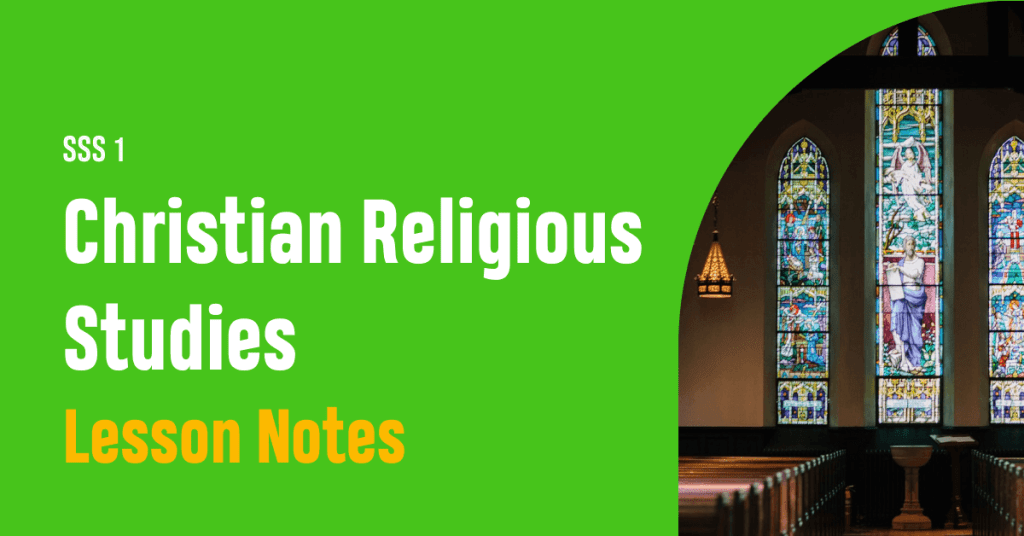SS1 Christian Religious Studies Scheme of Work
Download the Senior Secondary School 1 (SS1) Unified Scheme of Work for Christian Religious Studies to serve as a guide for educators

Home » SSS1 Scheme of Work » SSS1 Christian Religious Studies (CRS) Scheme of Work
Home » SSS1 Scheme of Work » SSS1 Christian Religious Studies (CRS) Scheme of WorkAbout SS1 Christian Religious Studies Scheme of Work
Christian Religious Studies (CRS) is a subject taught in secondary schools where students learn about Christianity. It is the study of what Christians believe, how they worship, and how Christianity has affected society. It teaches several Bible stories, Christian traditions, and what is right and wrong according to Christian teachings.
The main aim of teaching CRS in secondary schools using the new and improved Lagos state unified scheme of work is to help students understand the most important beliefs of Christianity and how they relate to different parts of life.
Christian Religious Studies is taught in Secondary schools to shape students’ character by instilling moral values and ethical principles derived from the Bible. It teaches them the importance of virtues like honesty, kindness, compassion, and integrity, guiding them to make righteous decisions in their daily lives.
Assessment Guide
In senior secondary school 1, students are assessed in Christian Religious studies based on the school’s prerogative. However, typically, they are evaluated through tests or quizzes (Continuous Assessment Tests) and end-of-term exams.
Grading follows a scale from A to F, with A representing excellent performance, typically scoring around 70% or 80%, and F indicating failure, usually below 50% or 45%.
Download SSS1 Christian Religious Studies (CRS) Scheme of Work

Know what’s expected of you as an educator
Download the Unified Scheme of Work for Senior Secondary School One (SSS1) Christian Religious Studies (CRS)
Get SSS1 Christian Religious Studies Lesson Note

Never bother about writing lesson notes again. Get our well written SSS 1 Christian Religious Studies lesson notes for (First, Second & Third Term)
SS1 First Term Scheme of Work for Christian Religious Studies
| LAGOS STATE MINISTRY OF EDUCATION: UNIFIED SCHEMES OF WORK FOR SENIOR SECONDARY SCHOOLS | ||
| Christian Religious Studies Scheme of Work for Senior Secondary Schools 1(SSS1) | ||
| Class | S.S.S 1 | |
| Subject | Christian Religious Studies | |
| Term | First Term | |
| Week | Topic | Breakdown |
| 1 | Jesus as the door and good shepherd | Jesus as the lamb Jn. 1:29-34. |
| Jesus as a. Door and good shepherd. Jn 10:1-18. | ||
| 2 | Jesus as the living bread and water | Jesus as the living bread and water. Jn. 4:7- 215, Jn. 6:25-40. |
| Values beside food and water that are necessary for growth. | ||
| 3 | Jesus the true vine | Jesus as the true vine and God the vine dresser. Jn. 15:1-8. |
| 1. Importance of fruit bearing 2. Benefits of abiding in Christ | ||
| 4 | Jesus is the light of the world | 1. Jesus as the light of the world. Jn. 3:19, Jn. 8:12, Jn. 9:4-5. 2. Walking in the light. Jn. 12:35- 36. |
| 1. Consequences of walking in the darkness. 2. Social vices as evidence of walking in darkness e.g cultism, examination mal-practice | ||
| 5 | God’s love for man | 1. Meaning and types of love. 2. Demonstration of God’s love to human being. Jn. 3:16-18, Hosea 1-4. |
| Need for human being to respond to God’s love. | ||
| 6 | Love for one another | 1. Ways to demonstrate love for one another 1 Jn. 4:7-8, Jn. 3:17- 18. 2. Qualities of love. 1st Cor. 13:1-13 |
| 1. John’s message of love for one another. J. 3:34-35, Jn. 15:12- 13, 1st Jn. 4:7-21. 2. Supremacy of love 1st Cor. 13:1-13 | ||
| 7 | Justification by faith | 1. Meaning and need for justification. Rm. 3:23, Gal. 3:19-2. 2. Works and law do not justify anybody. Rm. 4:1-5, Gal. 2:16- 21. |
| 1. Faith in Jesus Christ as condition for justification. Rm. 1:16-17, Rm. 4:1-5 2. Fruits of justification. Gal. 2:19-21. 3. Faith as the condition for justification. Rm. 10:16-21., Gal. 2:16- 22., Rm. 1:16-17, Rm. 4:1-5 | ||
| 8 | Law and grace | 1. Law and grace Gal. 3:10-14, Rm. 4:13-25, Rm. 5:18- 21. 2. Difference between law and grace Rm. Rm. 3:14- 21, Rm. 4:13-25, Rm 5:18-21, Gal. 2:15- 21. 3. Purpose and significance of law and grace. |
| 9 | New life in Christ | 1. Meaning of old life and characteristics of old life. Gal. 5:19-21, Col. 3:5-7, e.g fornication, cultism, idolatry, anger, selfishness, strife, homosexuality, lesbianism, fraud, injustices, bribery, tax evasion etc. 2. Meaning and characteristic of new life e.g love, humility, patience, tolerance, justice, patriotism, respect for handwork and constitutional quality. |
| 1. Need for change Rm. 6: 1-4, Rm. 15:18-19 2. Need to stick to new life. Col. 3:1-6, Rm 7:46. | ||
| 10 | New life in Christ (continue) | Paul’s letter to the Philippians on humility. Phil. 2:1-11. |
| Paul, Nicodemus, and Matthew as a case study of living a new life. Acts 7:1-31, Jn. 3:1-15, Matt. :9-13 | ||
| Paul’s teaching to Colossians on living a new life in Christ. Col. 3:1-17. | ||
| 11 | Revision | |
| 12 | Examination | |
SS1 Second Term Scheme of Work for Christian Religious Studies
| Term | Second Term | |
| Week | Topic | Breakdown |
| 1 | Son ship | Jesus Christ the Son of God. Rm. 8:3, 17, 32. |
| Christians are also children of God. Rm. 8:1-39, Gal. 3:25-29, Gal. 4:6-7, Eph. 1:5 | ||
| 2 | Qualities of the children of God, e.g love, peace, humility, gentleness, long sufferings, bearing one another burden, meekness | Qualities of the children of God, e.g love, peace, humility, gentleness, long sufferings, bearing one another burden, meekness, etc. |
| Rights and responsibility of children of God. | ||
| 3 | Son ship (continued) | Duties of Nigeria citizens to the government. |
| 4 | Faith and works | 1. Salvation is by faith alone not by works (good deeds) Gal. 1:14, Eph. 2:8, Heb. 11:1-5,6. 2. Genuine saving faith manifests itself through works. James 2:14-26. |
| 5 | Faith and works (Continued) | 1. Meaning of salvation. 2. The procedure by which man can obtain salvation. 3. Men in the bible that demonstrated strong faith e.g. Daniel, the three Hebrew men. Caleb and Joshua, Abraham. 4. The benefits of the faith of Daniel, Joshua, Abraham, and the three Hebrew men |
| 6 | The fruit of the spirit | 1. Definition of fruit as in the context 2. the fruit of the flesh Gal. 5:1-21 3. the fruit of the spirit Gal. 22-25 4. How to bear the fruit of the spirit. Acts. 2:38. Rm. 10:9- 10 |
| 7 | Spiritual gifts I | 1. Definitions – Spiritual gifts – Talents I Cor. 12:4- 8, Eph. 4:11-13 2. Distribution of spiritual gift. Cor. 12:7-11. 3. Differentiate between spiritual gifts and talents. 1 Cor. 12:7, 11; Eph. 4:1-end. |
| 8 | Spiritual gifts II | 1. Spiritual gifts, Romans 12:6-8, I Cor. 12:28, Eph. 4:11. 2. Hierarchy of spiritual gifts, 1Cor. 12:28, 31, 14:1-5. 3. How to identify and exercise their spiritual gifts |
| 9 | Forgiveness | 1. Meaning of forgiveness 2 Cor. 5:18-19, Heb. 8:12. 2. How to receive forgiveness for one’s own sin, 1Jhon 1:9- 18. 3. Jesus teaching on forgiveness Matt. 6:12-15. 4. Effect of unforgiveness. Matt. 18: 21-35 |
| 10 | Right and obligations of family members | 1. Types of family – Nuclear family – Extended family 2. Rights and duties of family members, Colossians 2:18-21. |
| 11 | Revision | |
| 12 | Examination |
Download SSS1 Christian Religious Studies (CRS) Scheme of Work

Know what’s expected of you as an educator
Download the Unified Scheme of Work for Senior Secondary School One (SSS1) Christian Religious Studies (CRS)
SS1 Third Term Scheme of Work for Christian Religious Studies
| Term | Third Term | |
| Week | Topic | Breakdown |
| 1 | Humility | 1. Meaning of humility. Phil. 2:1- 11. 2. Ways of demonstrating humility. 3. Benefits of humility. James 4:10; 1 Peter 5:6. 4. Consequences of pride. James 4:6, 1 Peter 5:5, Matthew 23:12. |
| 2 | Effective prayer | 1. James teaching on prayer. James 1:1-8, 4:1-3, 5:13-20. 2. Jesus taught his disciples how to pray. Matthew 6:7-13. 3. Reasons for unanswered prayer, Matt. 6:7-13. 4. Types of prayer |
| 3 | Living a life of witnessing for Christ I | 1. Peter’s message on Christian living. 1 Pet. 1:13-17, 2:9- 25, 4:1-19. 2. Paul’s Statement on Children of the Light, Rm. 13:11-14. 3. Social vices and witnessing to Christ. |
| 4 | Living a life of witnessing for Christ II | 1. Tolerance and peaceful co- existence. 2. Civil responsibilities – Meaning – Example 3. People in authority to serve with the fear of God. Rom. 13:1-7 |
| 5 | Christian attitude towards persecution I | 1. Peter’s message to Christians under persecution. 1 Pet. 1:5-9, 4:12-19. 2. Jesus’ message on a case of enemies Matt. 5:38-48. 3. The persecution of Christ. |
| 6 | The Christian attitude towards persecution II | 1. Suffering and the Christian faith. 2. Christian attitude to persecution. 3. Various forms of persecution. |
| 7 | Impartiality I | 1. Meaning of impartiality. 2. All human beings are equal before God. 3. Warning against prejudice in James 2:1-13. 4. The “Golden Rule”, Matthew 7:12, Lk. 6:31, Negative effects of nepotism, favoritism and tribalism on society |
| 8 | Impartiality II | 1. St. James teaching on impartiality. 2. Ways the church today falls short of the standard James recommended. 3. Areas of Public life where partiality is manifested. |
| 9 | The resurrection | 1. The accounts of resurrection in Matthew 28:1-8, Mark 16:1-8, Luke 24:1-11. 2. Significance of resurrection to the Christian faith. 3. women’s activities in the story of resurrection. 4. Compare and contrast the three accounts of the resurrection synoptic gospel. |
| 10 | The second coming of Christ | 1. Jesus talks of the last judgment when he comes. 2. How we ought to prepare for the second coming of Christ, Matt. 24:31- 46. 3. The sign of the coming of Christ 1Thess. 4:13-18. |
| 11 | Revision | |
| 12 | Examination |
Get SSS1 Christian Religious Studies Lesson Note

Never bother about writing lesson notes again. Get our well written SSS 1 Christian Religious Studies lesson notes for (First, Second & Third Term)
Recommended Christian Religious Studies Textbooks for Senior Secondary School 1
The recommended Christian Religious Studies textbooks for SSS1 include but are not limited to the following:
- Christian Religious Knowledge for Senior Secondary Schools with Workbook by John Chiakwelu
Mid-Field Publishers Ltd SS 1-3
- Fundamental Christian Religious Studies for Senior Secondary Schools by Osinloye Rebecca .A., Aderemi Adeoye et al
Noble Resources Ltd
- Christian Religious Knowledge for Senior Secondary by H.A Adigwe, R.I Arubalueze, E.I Alutu et al
Africana First Publishers Book House Trust
- Christian Religious Knowledge for Senior Secondary Schools by A.A Adeyinka et al
Learn Africa Plc SS1-3
- Christian Religious Knowledge A Complete Guide by A.E Izuchukwu et al
Learn Africa Plc





























